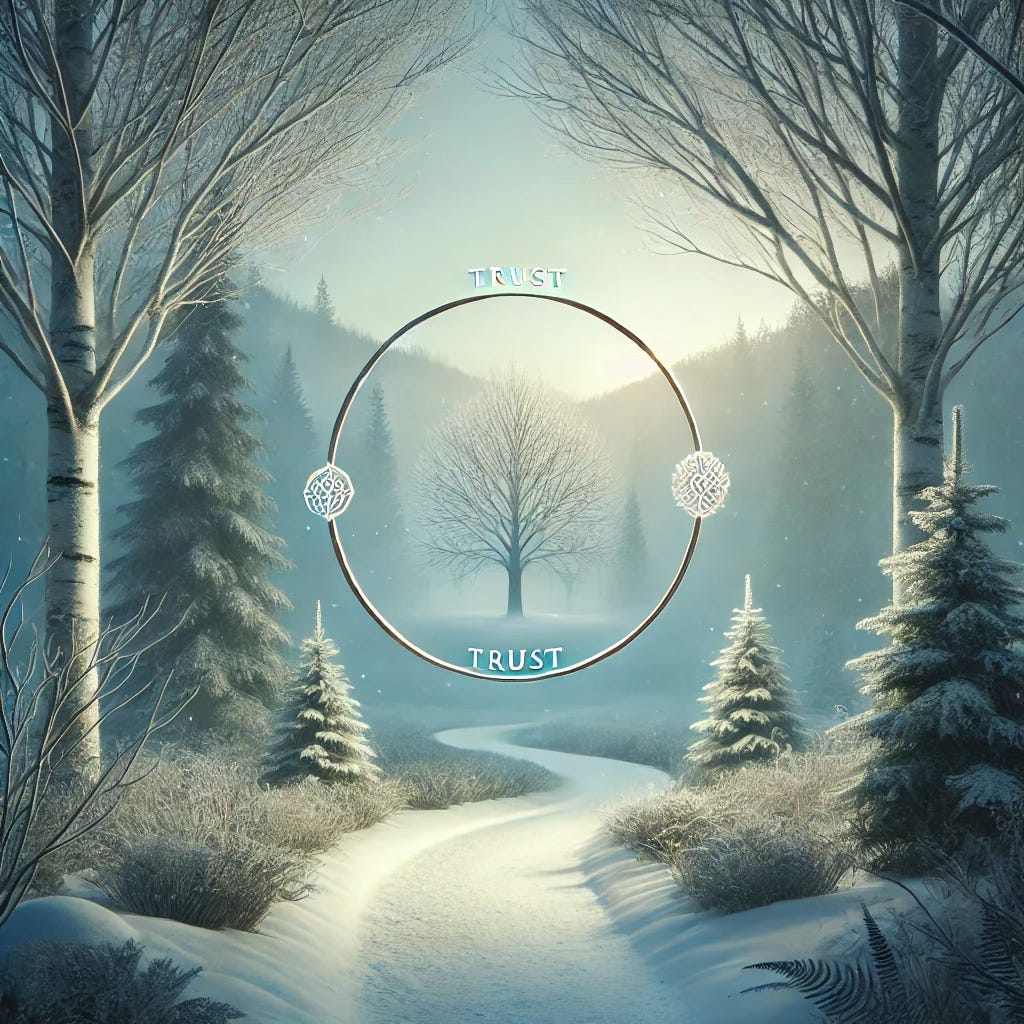Season of Self: Trusting the Process
Reclaiming self-trust, releasing control, and embracing life’s cycles
Trust Begins Within
Whenever I hear someone say, “I don’t trust anyone,” or, “People can’t be trusted,” it’s like an exclamation point lights up in my mind. I get curious because, in my experience, the inability to trust others is often rooted in a deeper issue: a lack of trust in oneself. When we don’t trust our own judgment, boundaries, or intuition, it’s nearly impossible to trust others.
Trusting others isn’t about giving them control over us—it’s about reclaiming control of our own awareness, boundaries, and decisions. It’s about trusting that even when things don’t go as planned, we have the capacity to navigate what comes next.
I see trust differently. I don’t expect people to be perfect, nor do I expect them to never disappoint me. I trust people to be exactly who they are—and I trust that I will know when to stay, when to set boundaries, and when to walk away. It’s a trust rooted in awareness, self-compassion, and a commitment to honoring my needs, even when others don’t understand them.
This trust has been my anchor through so many uncertain seasons. When I left my marriage, it wasn’t because I was sure of what the future would look like—I wasn’t. But I trusted that I had the tools to figure it out, even if the road ahead was messy. And that’s the kind of trust we’re exploring today: not the kind that eliminates uncertainty, but the kind that carries us through it. The trust that dismantles the narratives of control and scarcity, and the trust that frees us to embrace both the messy and magical parts of life.
Supremacy Culture and the Erosion of Trust
Supremacy culture thrives on distrust because it keeps us disconnected from ourselves and each other. It tells us we need external validation to know if we’re making the right decisions. It convinces us that mistakes are failures, that our intuition is unreliable, and that control is the only way to stay safe.
For years, I struggled with trusting myself too. I’d second-guess my decisions, replay conversations in my head, and question whether I’d done or said the “right” thing. Supremacy culture had conditioned me to seek external validation, to believe that my worth and success were tied to how well others approved of my choices. It wasn’t until I began my healing work that I realized how disconnected I’d become from my inner wisdom.
These narratives aren’t random—they’re part of a larger design. When we’re disconnected from our inner knowing, we become more dependent on external systems of power. We seek approval from bosses, partners, institutions, and societal standards instead of trusting what feels right in our own bodies.
Supremacy culture erodes trust in several key ways:
It conditions us to fear mistakes, making us doubt our ability to recover when things go wrong.
It convinces us that control is safety, so we hold on tightly, leaving no room for uncertainty or growth.
It tells marginalized communities that their lived experiences are invalid, leading to internalized doubt.
But trust isn’t about avoiding uncertainty—it’s about navigating it with grace. It’s about knowing that even if things don’t go as planned, we can still adapt, learn, and grow.
When Control Masquerades as Trust
I used to think that being in control meant I was being responsible, that if I could just plan everything perfectly, nothing would go wrong. But control isn’t trust—it’s fear wearing a different outfit.
Supremacy culture thrives on our need for control. It convinces us that if we’re constantly vigilant, constantly overworking, constantly planning for every possible outcome, we’ll be safe. But that’s a lie. Control doesn’t protect us from harm—it just exhausts us in the process.
I remember the time when I tried to control every aspect of my day as a form of self-protection. I thought if I could anticipate every need, every desire, every meltdown, every forgotten lunch, and every delayed morning, I could avoid chaos. But life doesn’t work like that. Marriage doesn’t work like that, and kids don’t work like that. And what my first marriage taught me was, honestly, I don’t work like that either.
The day I finally let go of control wasn’t some grand, life-changing moment. It was mundane, it was a quiet acceptance of what i could not control and in that moment I remembered the heavy metal blac plaque with yellow writing that hung in my childhood apartment:
"God grant me the serenity to accept what I cannot change"
"The courage to change the things I can"
"And wisdom to know the difference"




